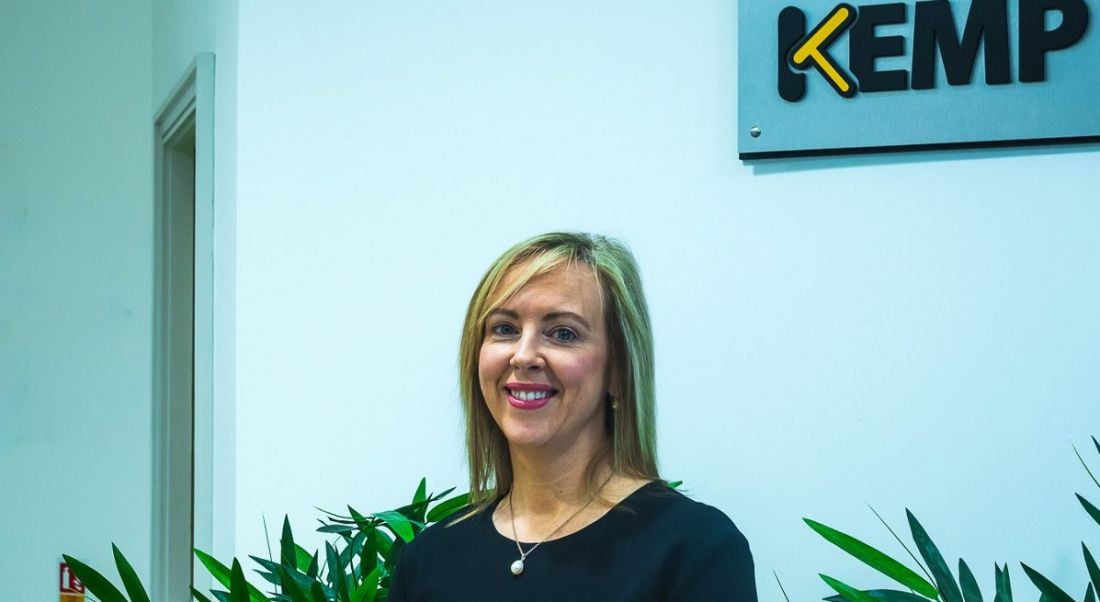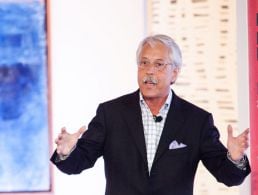Sinead Grant is the senior people operations generalist in Kemp Technologies and has worked in HR across a wide range of industries.
As we look ahead to the tech trends coming in 2019, human resources (HR) professionals have already had to prepare for and adapt to the changing workplace.
Sinead Grant is the senior people operations generalist in Kemp Technologies. Grant has worked across a variety of industries throughout her career and understands the crucial role customers play in shaping HR initiatives. She also recently completed a master’s degree in HR management at University of Limerick in order to keep pace with the changing workplace trends.
Here, she discusses her the HR challenges coming down the line and the strategies she’s using to prepare for the future of work.
What are the biggest HR challenges facing Kemp Technologies right now?
The market for highly skilled IT staff is extremely competitive at present. At Kemp, we have invested a lot of time in understanding our current employees’ perceptions of what they believe it’s like to work for us, and we share these stories with prospective hires. Our collaborative relationships with Limerick Institute of Technology and University of Limerick facilitate the placement of interns to work within our R&D and support, and professional services departments. Several interns have subsequently progressed their careers in Kemp, with some advancing into leadership roles.
Ongoing changes in the technology sector impact customer preferences, so it is crucial that, as an organisation, we remain agile and responsive to these market shifts. Our product portfolio has evolved from what was traditionally a hardware product to now include multicloud application deployments. For HR, that presents the challenge of ensuring our employees have the tools and resources necessary to navigate transition, so we embed continuous learning and development into our daily routines.
We have recently integrated LinkedIn Learning with our own in-house learning management system, Kemp University. This facilitates our employees’ participation in microlearning from any remote location, as and when they wish. One of the biggest challenges with training is being able to allocate the required time to do it, so this approach works really well for us.
What are some of the main responsibilities of your own role, and how much of it is spent on recruitment?
We have added 20 new hires across our teams in EMEA this year, so it would be fair to say a considerable amount of time in 2018 has been focused on recruitment. In doing so, it has been really important for us to consider the employee-organisation relationship. We do this via competency-based interviewing to ensure prospective employees fit with our changing environment.
I’m working on an exciting project at present as part of a cross-functional team regarding implementation of a skills-competency matrix across our organisation. This tool will support our employees’ personal and professional development.
Enhancing our corporate and social responsibility strategy is something I have focused on this year also. Our local community and our employees have benefited from Kemp being involved in some fantastic initiatives such as CoderDojo, Junior Achievers and Young Innovators. These events help nurture future talent and encourage future careers in STEM. It’s great to be in a position to give something back.
What are the HR technology trends and opportunities you’re capitalising on?
We leverage our human resource management system tool, Namely, as part of our performance management process. It’s a collaborative digital platform for employees and managers to review and discuss performance, and set future goals.
We implemented a new applicant tracking system, Workable, to complement our continued recruitment in 2018. The interface is easily navigated, allowing our busy hiring managers a greater level of visibility on prospective candidates for open roles.
Our in-house communication tool, Yammer, allows us to share information globally. It’s a way for us to exchange stories and photos about events, which tend to be more socially focused, so it’s nice for everyone to know what our colleagues in each of the other office locations are getting up to!
What has been the biggest culture change within your organisation in the last five years?
Kemp has been growing rapidly since the initial establishment of our EMEA headquarters in 2010. Culture is not something that remains static within the tech sector. For any HR function that presents an ongoing challenge, it is also a fantastic opportunity to engage employees and involve them in the journey, too.
In particular over the last five years, while scaling all of our teams, we have been very conscious of our evolving cultural identity. Our CEO, Ray Downes, takes an active interest in HR initiatives that embed our core values into our daily operations. Participative projects seeking our employees’ feedback about their perceptions of working at Kemp have helped us update our core values, and we recognise and reward demonstration of these behaviours.
What key strategies are you using to prepare for the future of work?
We recently held our year-end extended leadership meeting, where 40 colleagues from across our US, APAC and EMEA regions were in attendance. It was an opportunity for a diverse range of key people with varying responsibilities to come together and discuss priorities leading into 2019. Diversity across teams is becoming a prevalent workplace trend, with many cross-functional teams connecting and working together on a virtual basis daily.
Our working environments are digital, and our employees are no longer tied to an office in the traditional sense, so we allow for a significant level of flexibility regarding work location, whether that be at home on occasion or while travelling to work-related events. A significant level of trust is therefore built into our manager-employee relationships, as we appreciate people have several commitments outside of work also. This approach really helps with overall productivity and employee wellbeing.
We also rolled out our first official mentoring programme in Kemp this year for our interns. The programme benefits everyone, especially from a succession-planning perspective, as it provides an opportunity for more experienced team members to share their knowledge and upskill newer employees.
What is the one thing you think HR teams should start doing differently?
I think it’s really important for organisations to embrace the concept that HR is everybody’s responsibility. HR teams can add the greatest value in the creation of initiatives that upskill and empower those with leadership responsibility in developing and engaging high-performing teams. It’s crucial for HR teams to understand operational context and challenges, and then to leverage data-driven decision-making to influence and prioritise key projects.
What resources can you not live without?
If I had to pick one, it would be Ibec’s website as it’s an invaluable resource regarding HR best practice and updates in employment legislation.
Of equal importance is to take some time away from the desk and connect with other HR professionals. Limerick Chamber of Commerce, Mid-West Regional Skills Forum, Ibec and CIPD have all hosted some very informative and enjoyable events this year.
One book worth mentioning is Taking the Measure of Work by Dail L Fields. It provides validated scales across a range of topics, from job satisfaction to employee commitment and workplace values. The scales are useful in understanding employee survey measures and outcomes, which can steer HR initiatives successfully.




